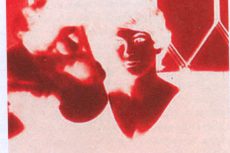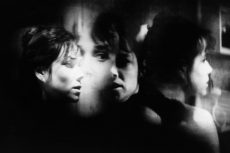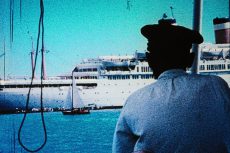“(found) foot’-age shoot’-out: Selections from the Austrian Avant-Garde.” February 9, 2016
- Schwechater
- Outer Space
- Passagen
(found) foot’-age shoot’-out: Selections from the Austrian Avant-Garde
Austrian avant-garde filmmaking emerged from an explosive era in postwar Austrian art that was characterized by the performative gestures of the Viennese Aktionists—who transformed human bodies into living canvases in disturbing, often scandalous happenings—and Expanded Cinema practitioners, who sought to break down the medium- and site-specificity of traditional filmmaking and filmwatching. The films in this programme give ample evidence of their inheritance from both these schools, most notably in their rupturing of both the image and the human body.
The expressive reworking of found footage is a key process in the work of many of the Austrian avant-gardists. Peter Kubelka created Schwechater from material he shot when he was hired to make a beer commercial; similarly, Kurt Kren, hired to document an Aktionist happening by the artist Otto Mühl, radically deconstructed the footage by subjecting it to his own preconceived editing score to create 6/64 Mama und Papa. For Alone. Life Wastes Andy Hardy, Martin Arnold optically printed a romantic interlude between Mickey Rooney and Judy Garland frame by frame, creating an ecstatic, animalistic dance that slyly reveals the sexual undertones of squeaky-clean 1940s conformity. In Outer Space, Peter Tscherkassky appropriated 35mm footage from the horror film The Entity and reprinted it by hand onto raw film stock, amplifying the scopophilic horror that confronts Barbara Hershey’s heroine in the original film’s denouement.
This quartet of canonical works is accompanied by films from other significant filmmakers. In Die Geburt der Venus and Pool, Moucle Blackout and Dietmar Brehm manipulate and reframe found footage into eerie expressions of sexualization. Mara Mattuschka draws strongly from the Aktionist tradition in her work, and NabelFabel is representative of her highly wrought performances. In Hernals, Hans Scheugl follows artists Valie Export and Peter Weibel through the eponymous Vienna neighbourhood, doubling their actions into a schizophrenic montage. Lisl Ponger has long explored how the historically closed Austrian society has been gradually changed through immigration, and her film Passagen now has a new resonance as Europe is confronted with another wave of migration.
Schwechater dir. Peter Kubelka | Austria 1958 | 1 min. | 35mm
6/64 Mama und Papa (Materialaktion Otto Mühl) dir. Kurt Kren | Austria 1964 | 4 min. | 16mm
Pool dir. Dietmar Brehm | Austria 1990 | 4 min. | 16mm
Die Geburt der Venus (Birth of Venus) dir. Moucle Blackout | Austria 1970–72 | 5 min. | 35mm
NabelFabel (Navel Fable) dir. Mara Mattuschka | Austria 1984 | 4 min. | 16mm
20/68 Schatzi (Sweetie) dir. Kurt Kren | Austria 1968 | 2 min. | 16mm
Passagen (Passages) dir Lisl Ponger | Austria 1996 | 12 min. | 35mm
Hernals dir. Hans Scheugl | Austria 1967 | 11 min. | 16mm
Alone. Life Wastes Andy Hardy dir. Martin Arnold | Austria 1998 | 15 min. | 16mm
Outer Space dir. Peter Tscherkassky | Austria 1999 | 10 min. | 35mm
Tuesday, February 9, 9 pm


